Choosing the best portable generator for your RV may seem overwhelming, but when you break the process down by focusing on the most important decisions, you can find the right one for your needs. Before we jump into the article, choosing the right generator is less about the size of your RV’s electrical system and more about your exact power needs when camping. In fact, a generator that a 30-amp RV uses may be perfectly capable of supplying your electricity needs in your 50-amp RV. There is no specific 50-amp generator, in case you were wondering.
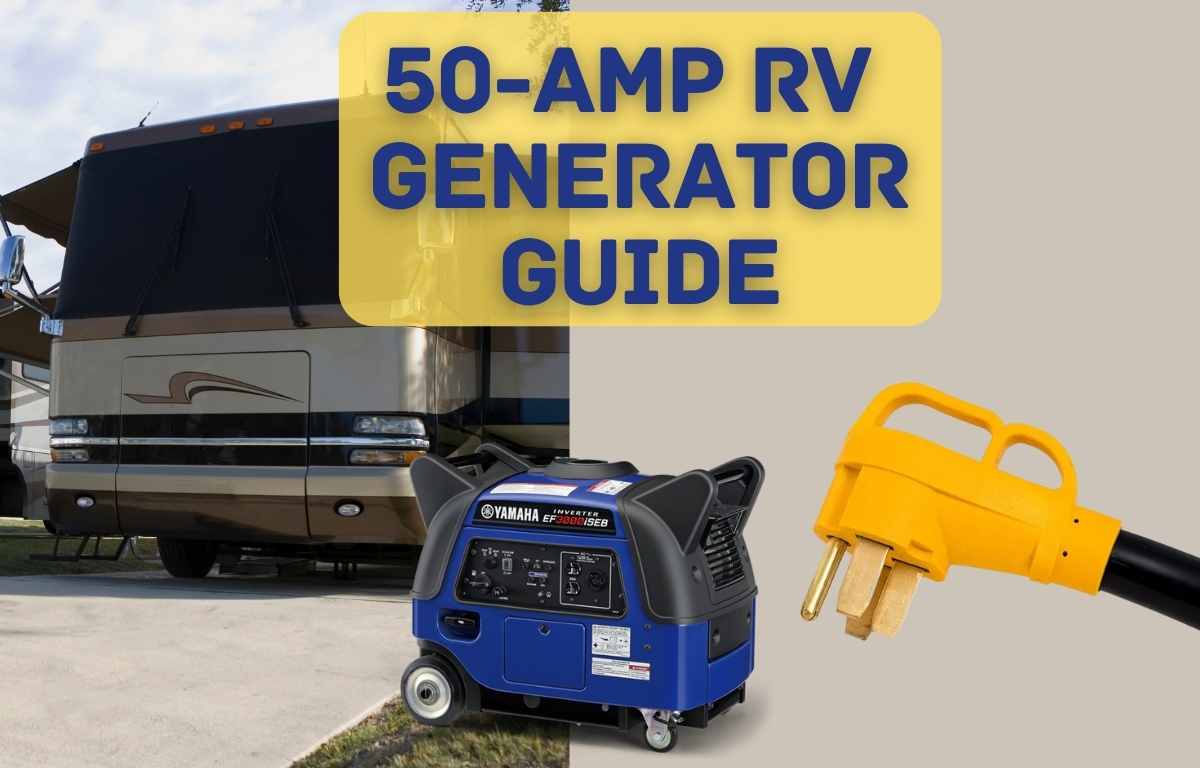
Generators are a great option when you’re away from a power source and need to run your RV. However, unless you have a complex solar setup, running many of your appliances without one will be hard when no shore power is available. Choosing the best generator for your needs is important because you want to ensure you have sufficient power, but not necessarily more than you can use.
The first thing to consider when shopping for a generator for your 50-amp RV is the generator type. You can choose from two main types of generators: 1) an open frame standard generator and 2) an inverter generator. I’ll describe both below, but I highly recommend purchasing an inverter generator if using it primarily for camping. The reason is that it’s safer for your equipment and much quieter.
Types of generators
There are two types of generators that you’ll find at your local stores: Open-frame conventional generators and inverter generators. While I’ll briefly describe the differences between the two, if you’re purchasing a generator for your RV, you’ll most likely be interested in an inverter generator.
Understanding the difference between the two types of generators is important. A generator converts mechanical energy into electrical power. Portable generators use an engine, just like your car, to produce the electrical current, turning it into AC (alternating current) used in household electronics.
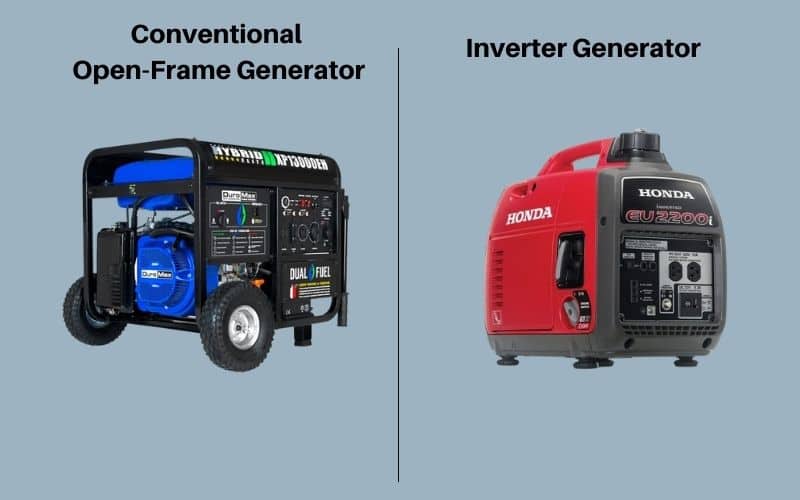
A conventional fuel-powered portable generator runs at 3600 rpm to generate 120 volts and a frequency of 60 Hertz. It’s the speed of the engine that creates the electricity supply. Since engines fluctuate slightly, their energy is not always steady electricity or clean. The fluctuations are referred to as harmonic distortion.
This distortion isn’t a problem for many electricity needs when powering mechanical devices. This is why you often see these generators used on construction sites to power heavy power tools. They work fine off of this type of electricity. However, in the last few decades, more and more devices have integrated electronics that prefer clean, steady energy. We’ll call them sensitive electronics. Things like computers, cell phones, TVs, streaming boxes, etc., all have sensitive electricity needs. For this reason, traditional generators aren’t always the best choice. Your electrical needs in your RV likely have many items that fall into this category.
While these devices will often still work off of non-clean electricity, you create more risk for them to fail. Eventually, a power surge can cause them to fail. This is why inverter generators have become so popular, among other reasons.
An inverter generator involves a few extra steps when producing electricity. While it will initially operate similarly to a conventional generator, it adds a few more phases to produce clean, steady electricity. It will initially create a high-frequency AC, turn it into DC electricity, and then back to a stable AC. This conversion from DC back to AC allows it to produce a steady stream of constant power.
Unfortunately, if you’re looking for a quiet portable generator with a 50 amp outlet, you’ll be hard-pressed to find one without spending a lot of money. Most generators with a 50 amp plug are open frames, which are not quiet. However, if you want an inverter generator with a 50 amp plug option, Sportsman makes one, but it’s expensive, heavy, and it’s an open frame.
- Type: Open Frame Inverter
- Peak surge watt: 8700
- Running watt: 7000
- Fuel Tank: 7 gal.
- Weight: 133 Lbs
- Noise: 70 dB at 0% load at 23 feet
What are the benefits of an Inverter Generator?
Aside from producing cleaner electricity, inverter generators have many other positive RV and camping benefits. For example, they are quieter, have better fuel efficiency, and are typically much lighter. Also, compared to a conventional generator, they have a much longer run time.
To learn more about the benefits of an Inverter Generator, I highly suggest you read the following article: The Complete Guide For Choosing an RV Generator.
In this article, we detail the benefits of an Inverter generator and help you decide if it’s the right option. The best 50 amp inverter generator will likely be somewhere around the 4,500-watt mark (if you plan to use AC).
What makes a generator good for a 50-amp RV?
As I already mentioned, there isn’t much difference between a generator you would use for a 30A RV and what you may need for a 50-amp one. The main consideration, above all else, is the size. By size, I don’t mean the physical dimension; I’m referring to the power output.
Most 50-amp RVs are equipped with this electrical service because it can potentially use more electricity. The key word here is “POTENTIAL.” Since many RVs have similar electrical appliances, the electricity demand is relatively similar under regular use. The difference comes when you have higher-demand RV appliances, like bigger AC units, residential refrigerators, washers, dryers, etc.
Think of your electricity supply as a bucket. The more demand you place into the bucket, the greater the amount of electricity you need. A 50-amp RV will have a larger bucket than a 30-amp smaller RV. However, if they are filled with the same electricity demand, it doesn’t make much difference what type of service it has.
If your electricity needs when running a generator is minimal, there isn’t too much of a reason to buy a larger generator. You should buy a generator for your electricity needs that you have 90% of the time, not the 10% when you may want a little more. Remember, there is no specific 50 amp generator for RV use. However, there you can find the best generator for 50 amp RV use if that makes sense. Also, larger generators (even inverter generators) are heavier, louder, and have a greater fuel consumption.
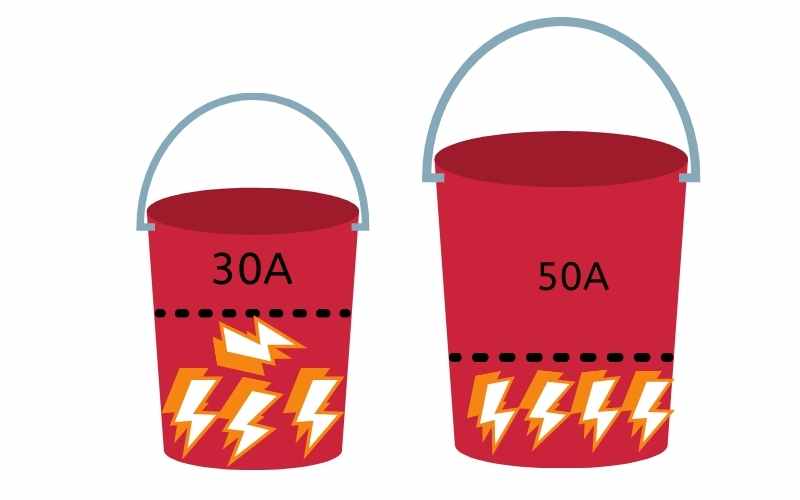
The one caveat that is relevant to many 50-amp RVs is air conditioning. Most 30-amp RVs will have one air conditioner. However, 50A RVs may have two air conditioners (or at least be wired for two). This AC setup is the main reason most manufacturers install 50A service.
Air conditioners, when running, don’t have an excessive power draw. However, you must ensure you have enough power to start them. For this reason, if you plan to run two AC units from a generator, you will want to plan accordingly. If you buy too small of a generator, you will risk tripping the generator circuit breaker or will need to run one AC at a time. So ensure you get a powerful generator if AC is a top priority.
How do you know what size generator to get?
Most inverter generators come in several sizes. The size of the generator is measured in watts. Likewise, the physical dimensions of the generator (plus noise level, fuel usage, and weight) increase as well. Higher capacity generators will have a larger motor and provide more watts of power.
When shopping for a generator, you’ll see inverter units offered in a range starting at 1,000 watts and up to 5,500 watts (or even higher). For a conventional open-frame generator, it’s not uncommon to see some models with over 10,000 watts.
Bigger isn’t always better for generators. What you gain in power, you lose in fuel economy, noise, and weight. To determine the size generator you need, you will want to do some simple math and determine the electricity consumption (total wattage) your RV will need when running off a generator. The article: The Complete Guide For Choosing an RV Generator has a lot of good information to help you do this.
However, to keep things simple, you can reference the graphic below to get a general sense of what size generator you may need.
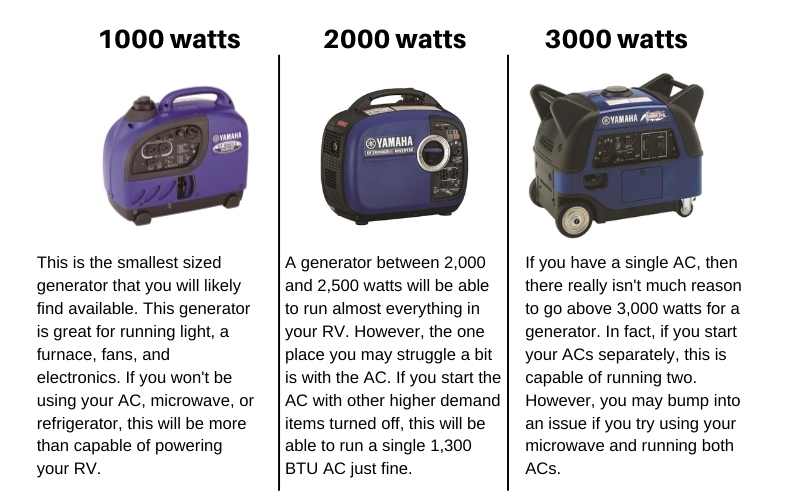
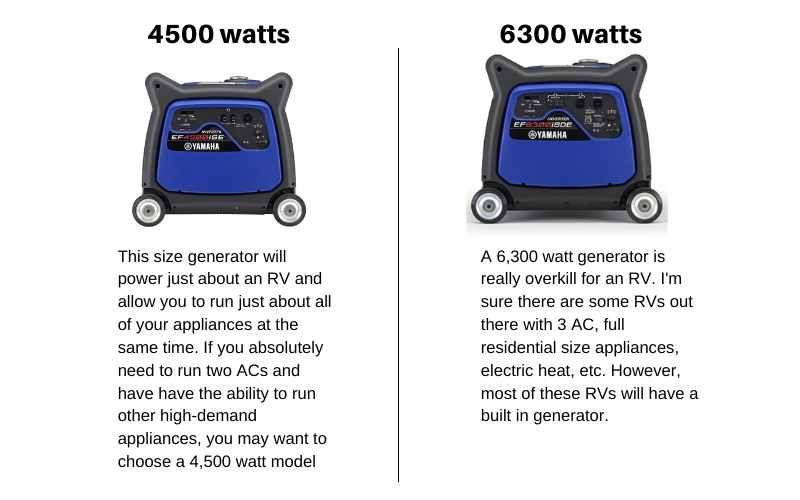
Air conditioners and starting watts
Refrigerators and RV air conditioners are two electrical appliances in many RVs that will have vast differences in starting watts vs. running watts. You’ll be able to hear an audible difference in your refrigerator or air conditioner when they start. What you’re hearing is the compressor kick-on. This high-demand power need will only happen when the appliance starts up or cycles. For example, a standard 12,000 BTU air conditioner may efficiently run off 900 watts but require nearly 2,200 watts to start up.
Some inverter generators are too small to start your air conditioner, even though they’ll be fine for running it. For this reason, it’s critical to size your generator for your starting power needs. While this usually isn’t an issue with refrigerators, air conditioners can be. As a result, they are typically the Achilles heel of choosing an appropriately sized generator.

Fortunately, you don’t need to purchase a huge generator to get your air conditioner to work. Instead, you can add an accessory to your air conditioner called a hard start kit. This addition is a simple, affordable product that acts as a mini-capacitor, giving your air conditioner starter an extra boost when powering up. A hard start kit can reduce your wattage needs to a level that a moderately sized generator can handle. I wish the RV industry started building units incorporating this cold start technology. Unfortunately, for most models, you need to add it yourself.
Size recommendation for a 50-amp RV Generator:
If you have a 50A RV with two air conditioners and plan to use them both, I would start by looking at a 3,000 to 4,000-watt generator. If you have one AC unit (or plan to use just one), you should be able to get by with a 2,500-watt generator. I own and use a 2,200-watt Yamaha inverter generator for my 50-amp outback travel trailer. I think this is the sweet spot for power, noise, and efficiency. It is powerful enough to run my single 13,000 BTU air conditioner as long as I don’t try to use the microwave, coffee maker, or vacuum cleaner when it’s starting. Another option to consider, while it may be more expensive, is to purchase two smaller generators instead of one large generator. Many generators will allow you to use a parallel kit to connect the exact same units together, getting double the power. The benefit to this option is that you will be able to have more flexibility and use a single unit for most of the time, save on fuel, and have the ability to add as much power as you can use (in an RV). The best RV generator is one that is sized for your needs.
Fuel type
Most RV inverter generators will come in a gasoline model or a dual fuel generator, which also uses propane. Even with high gas prices, gas models will be more affordable to run, but having a propane option is a nice feature, especially for RVers. If the generator you want offers both, then go for it. However, I wouldn’t buy a generator just to have the ability to use propane. Gas is easy to find, and a 5-gallon container will power your RV for several days at a time.
Plug Type:
The one feature that is a must-have for an RV is the ability to plug the RV directly into the generator. I have yet to see a generator offering a 50-amp plug on the control panel, but many models will have a 30-amp plug built into them. For a 50-amp RV, you will need to purchase an adapter to plug directly into the 30-amp outlet. Also, remember that your 50-amp RV is now a 30-amp RV. Being that you’re running off of a generator, you shouldn’t have any issues with the amount of power supplied. If you try to run your RV off a 20-amp outlet on the generator with an extension cord, you may end up with hot wires and a less-than-ideal situation. It’s always a good idea to use the RV plug that is attached to the unit.
Added features:
When shopping for the best generator, you’ll see many brands offering added features that may entice you. Some are very useful, but always make sure you purchase a reputable brand since power generation is the most important thing to consider. With that said, some features that can add a little more comfort to your camping trip include a remote start, USB ports built into the generator, a larger fuel tank, and an electric start. If the right size generator in the brand you want has these features, consider them a cherry on top of the Sunday.
- The Yamaha EF4500iSE is one of the most technologically advanced inverter generators available.
- Perfect for the RV enthusiast, the EF4500iSE is an ideal power source for either a fifth-wheel or travel trailer. The Boost Control Unit in the generator automatically senses when you need an additional boost and uses power from the internal 12-volt battery to produce additional amperage.
- 30 amp – 120V Twist-Lock Outlet.
- Overload Indicator – Dual 20A Outlets.
- Maximum AC Output – 4500 Watts
- Automatic Choke – Easy starting even in cold climates.
- 3 Years Limited Warranty
- Low Oil Warning System – Shuts the engine off to protect the engine if the oil level drops.
- Durable Yamaha MZ360 Engine – Designed for long life.
- Power Meter – Easy to read meter indicates the amount of power being used and the amount that’s available.
- Fuel Gauge – Indicates the amount of gasoline to indicate the refueling interval.
- 50 state legal – EPA & CARB.
Best 50-amp RV Generators Available Today
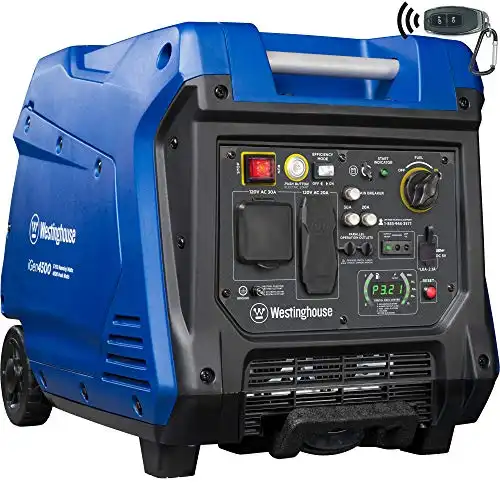 Westinghouse 4500 Watt Super Quiet Portable Inverter Generator
Westinghouse 4500 Watt Super Quiet Portable Inverter Generator
- 3700 Rated Watts and 4500 Peak Watts at Less Than 3% THD – Telescoping Handle – Gas Powered – Remote Start With Included Key Fob, Electric and Recoil Start
- Features a 5–20R 120V Duplex Household Outlet, an RV-Ready Tt-30R 30 Amp Outlet, and Two USB Outlets – Great Choice for Travel Trailers or Home Use – Strong Enough to Run All Your Essentials
- Led Data Center: Rotating Digital Display Shows Fuel Level, Power Output, Remaining Run Time, Voltage Output, and Lifetime Hours
- Extremely Quiet, Extremely Fuel Efficient: as Low as 52 dBA Noise Output and Up to 18 Hour Run Time on a 3. 4 Gallon Gas Tank – Features “Economy Mode” for Maximum Fuel Efficiency
- All Westinghouse Portable Generators are Functionally Tested in the Factory and May Contain Minimum Residual Oil and/or Fuel Odor; EPA and CARB Compliant; Backed By 3-Year Limited Service, Labor, and Parts Coverage and Nationwide Customer Service Network
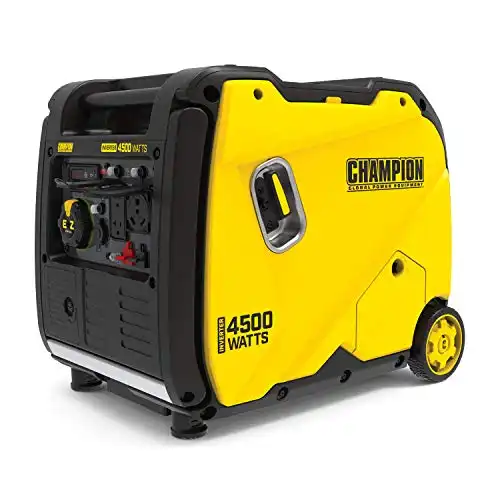 Champion Power Equipment 200986 4500-Watt Portable Inverter Generator, RV Ready
Champion Power Equipment 200986 4500-Watt Portable Inverter Generator, RV Ready
- DUAL FUEL: Operate your 4500-watt portable generator right out of the box on either gasoline or propane, plus the unit holds 0.6-quarts of oil (10W-30 oil included) and has a low oil shut-off sensor
- ELECTRIC START: Battery included, plus Quick Touch Panel allows you to access all your controls in one spot
- QUIET OPERATION: 61 dBA is perfect for RVs, tailgating, your next project or backup power for your home, featuring 4500 starting watts and 3500 running watts with up to 14 hours run time on gasoline
- CLEAN POWER: RV Ready with a 120V 30A RV, plus two 120V 20A household outlets with clean electricity (less than 3% THD) and 12V DC outlet with dual USB adapter
- CHAMPION SUPPORT: Includes 3-year limited warranty with FREE lifetime technical support from dedicated experts
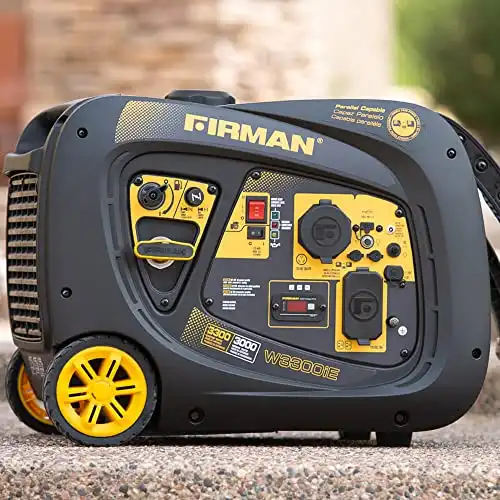 FIRMAN W03082 Extended Run Time Inverter Generator
FIRMAN W03082 Extended Run Time Inverter Generator
- Reliable, quiet, and parallel ready. That’s what FIRMAN aspires to give with this portable inverter generator
- The Whisper Series muffler keeps the FIRMAN W03082 running a quiet 59 decibels – well below the standards set by the National Parks Service.
- The W03082 portable inverter generator is suitable for camping trips in the wilderness or tailgating, and other recreational use of power supplies.
- This durable, lightweight, powerful inverter is built for years of use. You add gas and let it work for you. FIRMAN will take care of all your needs for those on the go.
- The W03082 comes with an engine oil bottle, oil funnel, spark plug wrench, screwdriver, 12V battery cable, floater charger, and quick oil drain
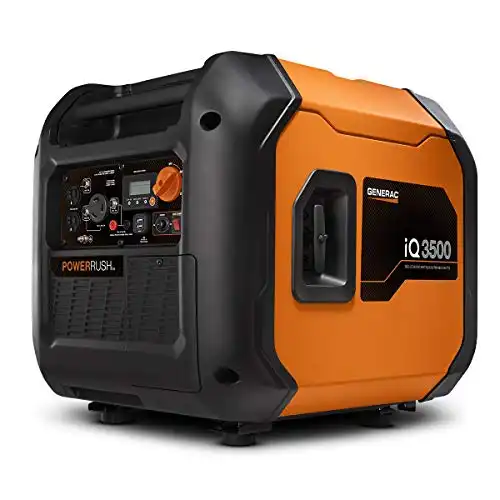 Generac 7127 IQ3500 3,500-Watt Gas-Powered Portable Generator, 50-State/CARB Compliant
Generac 7127 IQ3500 3,500-Watt Gas-Powered Portable Generator, 50-State/CARB Compliant
- ULTRA-QUIET – Advanced inverter technology and enclosure design provide optimal quiet performance
- POWERRUSH™ ADVANCED TECHNOLOGY – Delivers over 50% more starting capacity allowing you to do more with less (Increases electrical current upon demand; above rated output when starting electric motors)
- IDEAL FOR WORK OR PLAY – Durable steel enclosure, clean inverter power and easy portability make this the ideal generator for jobsites or recreational activities
- ELECTRIC START WITH POWERDIAL™ Start/Run/Stop – Three operation settings integrated into one simple-to-use dial (Battery Included)
- DIGITAL SMART LCD – Digital Wattage Meter, Run Time Remaining Display, Generator Status, Hour Meter and Fuel Level
- 30A TWIST LOCK OUTLET – Harness the full power of the generator
- USB PORTS – Charge mobile devices including smartphones and tablets
- ECONOMY MODE – Reduces noise and fuel consumption
- PARALLEL-READY – Connect two iQ3500 inverter generators for twice the power (Parallel Kit #7668 sold separately)
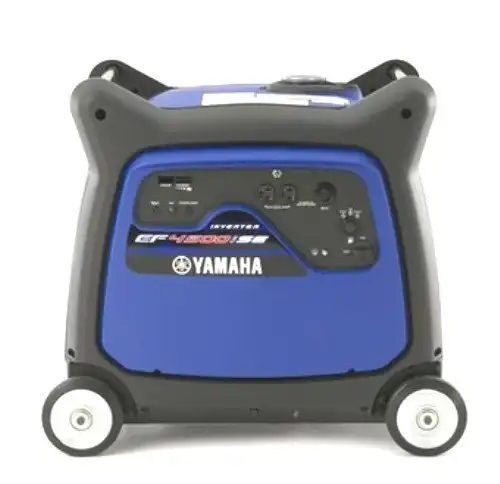 Yamaha EF4500iSE Portable Inverter Generator
Yamaha EF4500iSE Portable Inverter Generator
- The Yamaha EF4500iSE is one of the most technologically advanced inverter generators available.
- Perfect for the RV enthusiast, the EF4500iSE is an ideal source of power for either a fifth-wheel or travel trailer. The Boost Control Unit in the generator automatically senses when you need an additional boost and uses power from the internal 12-volt battery to produce additional amperage.
- 30 amp – 120V Twist-Lock Outlet.
- Overload Indicator – Dual 20A Outlets.
- Maximum AC Output – 4500 Watts
- Automatic Choke – Easy starting even in cold climates.
- 3 Years Limited Warranty
- Low Oil Warning System – Shuts the engine off to protect the engine if the oil level drops.
- Durable Yamaha MZ360 Engine – Designed for long life.
- Power Meter – Easy to read meter indicates the amount of power being used and the amount that’s available.
- Fuel Gauge – Indicates amount of gasoline to indicate refueling interval.
- 50 state legal – EPA & CARB.

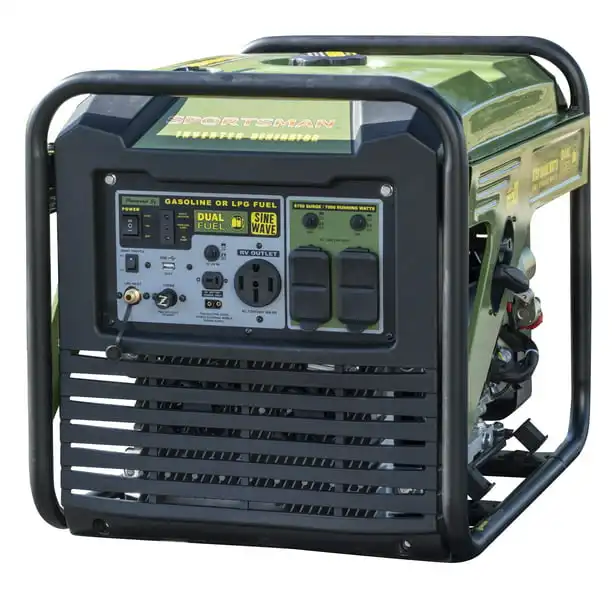
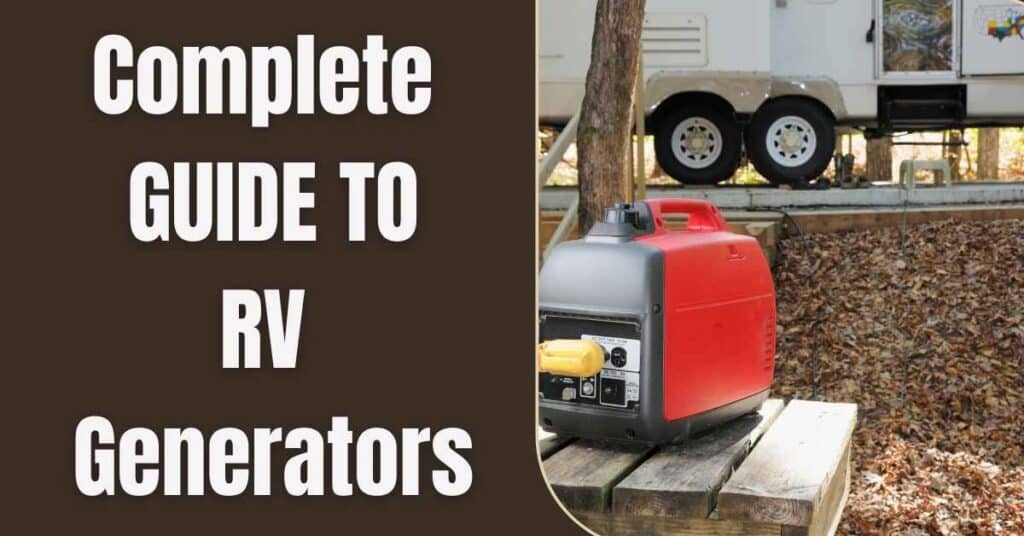

I would also like to recommend the WGen2000 Generator. I am impressed with this portable generator because it is full of several premium and innovative features while being offered at an unbeatable and competitive price. It can supply up to 2,500-watts peak power and 2,000-watt rated power.
That is a really great option as well. I’ll look to add it to the list. What’s you’re favorite feature?
All of these generators day they are 30 amp despite there title of best 50 amp generators. Do any of these generators run 2 AC units?
Hi- these are generators that are best suited for a 50A RV. Almost every RV generator will only have a 30A plug and you will need to use a 30-50 amp adapter.